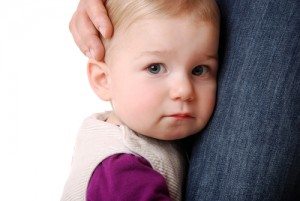 Isn’t it great to be wanted? But when this turns into clinginess it can become an issue, especially if your baby or child attends nursery.
Isn’t it great to be wanted? But when this turns into clinginess it can become an issue, especially if your baby or child attends nursery.
If you can’t go to the toilet without your number one fan, or have a small child permanently attached to your leg – this blog post is for you!
Clinginess – It’s Just A Phase…
How many times have you heard that? And has it helped? No, thought not. But for most children clinginess is just part of their developmental progress; just as is teething, bed-wetting and all sorts of other ‘issues’. Once it’s past you may even miss it, especially when they’re a hulking big teenager who avoids you at every opportunity.
But when you’re in the middle of this phase, it can be tough. We all need a bit of time to ourselves, and often we have no choice but to leave our little ones so we can go to work. So when you’re in the thick of it, it might help to understand the reasons for this clinginess:
Why Is My Baby (or Child) Clingy?
If your baby or child has no health problems or other issues that might affect their behaviour, then their clinginess is probably down to one of these reasons:
7 – 12 Months Old: Babies begin to become aware that they’re an individual around this age! This realisation means that they can get upset when you leave them (even just to go to the loo) as they still don’t understand that you will come back.
Learning To Walk: Developmental milestones like learning to walk can also cause separation anxiety. These transitions to becoming more independent can make a child feel insecure.
Illness: With hindsight you may realise that a short period of clinginess was the precursor to a bout of illness. Similarly, it may take a child a few days after they’re recovered to feel 100% and confident in being left at nursery again.
Changes In Environment: Small changes to routines can upset babies and children, so it’s no surprise that more significant changes can cause separation issues. Starting at nursery is one big milestone, moving house, and any other major upheavals that can make a child feel insecure.
A New Baby: One common reason that toddlers become clingy is when a new member of the family is born. They no longer have their parents to themselves, and sometimes they get fobbed off with poor replacements like grandparents!
Clinginess, or separation anxiety, is natural in a child up until about 20 months; even after this you may experience periods of clinginess that can generally be attributed to an outside factor such as starting at nursery. However, if your child’s anxiety is so overwhelming, that you might describe it as a fear of separation it may be advisable to speak to your GP or health visitor. Similarly, if your child does not settle when you have left them with a caregiver after a reasonable amount of time, you should speak to your nursery key worker, health visitor or doctor and ask for further support.
How To Help A Clingy Child
Our job as a parents and caregivers is to help children become confident and independent young people. Doing this in a loving and supportive way will help build your child’s confidence, with the reassurance that you are always there for them (even if you’re physically elsewhere). Here are a few ideas for helping a clingy baby or child:
- Play peepo and hide and seek with your baby so they get used to the idea that people and things (teddy perhaps) can go away and come back.
- Try not to be an anxious parent. Always saying ‘no’ and worrying about accidents and danger will make your child anxious too. Yes of course there are dangers out there, but it’s important to teach children how to deal with them, rather than be frightened of them.
- Practice separation. Leave your child for a short amount of time with a relative or friend and gradually build up the time you spend away.
- Make sure your baby or child is not overtired or hungry. If you’re planning to leave your baby with someone else, make sure they are on top form. Tired and hungry babies are cranky and this will make the separation harder.
- Have a “goodbye” ritual. Little ones like routines, it gives them security and reassurance. They will also learn to associate your goodbye ritual with you coming back.
- Take a special toy. If your baby is going to nursery or to someone else’s house, let them take a favourite teddy, blanket or other special item along with them.
- Consistency. Try to have consistent childcare in place, rather than lots of different childminders, nannies etc. When your child starts at nursery or with a new carer give them sufficient time to settle in. Expect a period of clinginess and allow for this when dropping off.
- Give in occasionally. In some situations why not embrace the clinginess? Of course, if you’re dropping at nursery and have to be somewhere else in 20 minutes this won’t be possible, but in other situations it could be. For example, if you’ve taken them to a toddler group and they don’t want to run off and play, why not spend the time with your child instead? Giving your child the reassurance that you’re not trying to push them away, could be just what they need.
If you have any tips for helping a clingy child (and their parents), please share your experience below.

